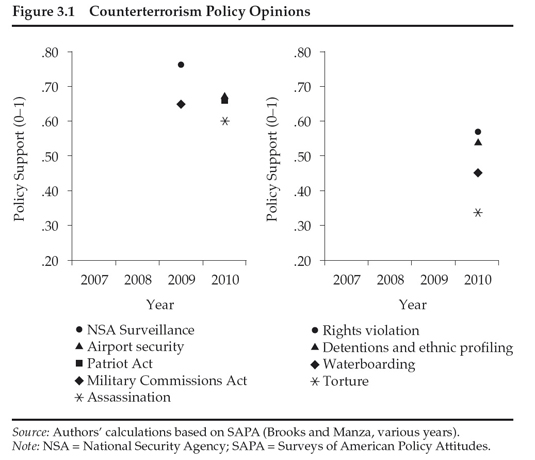Main navigation
Between 2007 and 2010, sociologists Jeff Manza and Clem Brooks conducted three nationally representative surveys to systematically examine Americans' attitudes toward counterterrorism policies. Their data, published in our new book, Whose Rights? Counterterrorism and the Dark Side of American Public Opinion, offer an interesting empirical perspective on American attitudes at a time when the debate over the use of drones, extrajudicial killings and extraordinary rendition has re-emerged. Here is an excerpt from the volume:
Figure 3.1 presents our analysis of these data, and symbols indicate the mean level of support for a specific counterterrorism policy or practice. [The survey's] counterterrorism items have a range of 0 through 1, higher scores indicating greater support. Of the ten policies and practices at hand, it is NSA surveillance of American citizens and suspected terrorists that elicits the highest level of support. With a score of 0.76, the NSA surveillance item’s score is well above levels of support for the next three counterterrorism items, all of which cluster together: airport security (0.67), the Patriot Act (0.66), and the Military Commissions Act (0.65). Next is assassination, where the targeting of “individuals suspected of being al-Qaeda or Taliban leaders” receives a score of 0.60.

These first five counterterrorism items show what amounts to a fair amount of support. All scores are well above the 0.50 scale midpoint. The right panel of figure 3.1 presents data for the remaining five items. The rights violation item leads the way, 0.57 indicating that respondents’ average opinion is shaded toward agreement with the position of taking “all steps necessary to prevent additional acts of terrorism.” Not far behind are opinions on detention, the mean for which is 0.54. In the 2010 SAPA survey, the detention and ethnic profiling items have the same item score of 0.54. The waterboarding item is next with a score of 0.45. With an even lower score of 0.34, the practice of torture easily elicits the highest level of public opposition. Given that waterboarding is best understood as a subset of torture, the contrast between opinions on these two counterterrorism practices merits a note in passing because it anticipates the cognitively induced framing effects we probe more systematically in chapters 4 through 6.
So far, a key result that stands out is how relatively positive attitudes toward many counterterrorism policies were, nearly a decade after the 2001 terrorist attacks. The SAPA items by design make no effort to sugarcoat or otherwise lower the bar when it comes to measuring support for contentious counterterrorist activities. Nonetheless, seven of our ten items show positive and quite strong support in many cases. As dismaying as it may be to civil libertarians, this is quite consistent with past polling on post-9/11 policies that we discussed in the previous section.





